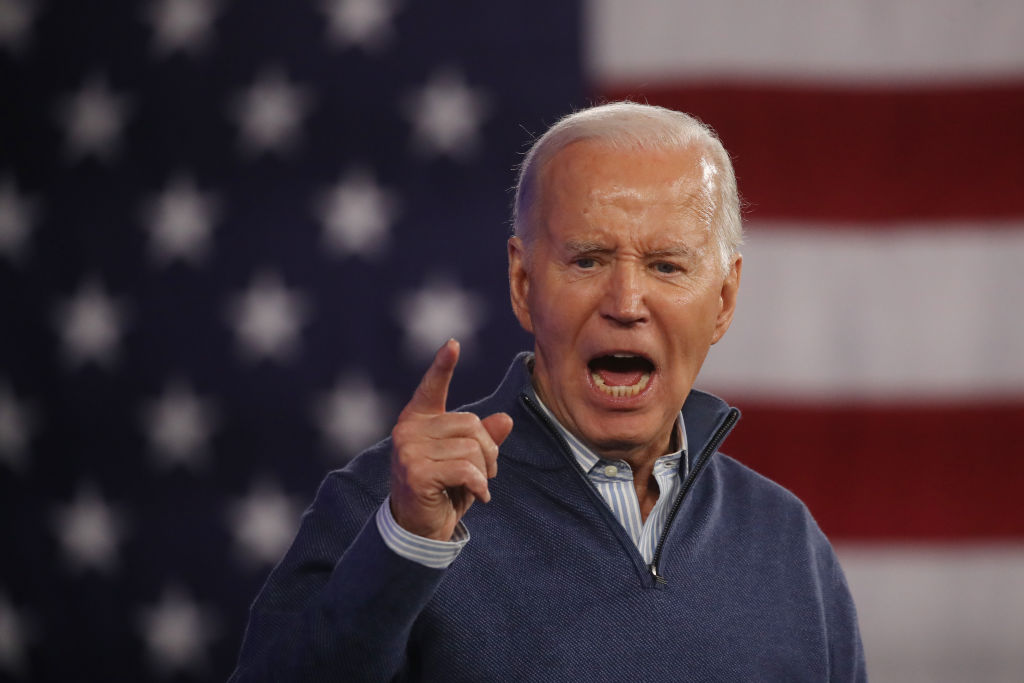America has a fever, and the only prescription is more catastrophising — at least that’s what Joe Biden’s campaign seems to believe ahead of Thursday’s CNN debate with Donald Trump.
In an opinion piece for the New York Times today, former Democratic presidential candidate and Trump opponent Hillary Clinton refers to the Republican nominee as “a convicted criminal out for revenge” and quotes prior criticism of him as a “threat to democracy”. The White House incumbent has already adopted this approach as an attack line, and late last week Axios reported on the Biden team’s apparent plan to focus its campaign on Trump as a grave threat to democracy.
Mike Donilon — one of the President’s key political advisors — holds that the January 6 Capitol riot will play a role in the 2024 election similar to that of September 11 in the 2004 election. As Donilon puts it: “I think the biggest images in people’s minds are going to be of January 6.”
As a political matter, the parallel is troubled, and this gambit might rely on a fundamental misunderstanding of the challenges facing the Biden campaign. The rally-round-the-flag effect caused by an attack by an external actor (Al-Qaeda) sent George W. Bush’s approval rating to the moon. While his popularity did slowly drift earthwards, Bush’s approval rating was still averaging in the high 40s by June 2004. He was ahead of John Kerry, his Democratic opponent, by a few points in polling averages.
Things stand very differently with Biden. His approval rating hovers well under 40%. Though there has been some tightening in recent days, he is still behind Trump in polling averages. Bush was simply in a much stronger position in the summer of 2004 than Biden is today and, even then, only 120,000 votes in Ohio kept Kerry from the White House.
To some extent, this strategy can be attributed to the way that the Washington establishment has anointed Biden as its tribune against populism — Clinton called him “one of the most empathetic leaders we’ve ever had” in today’s article. With over 50 years in Washington, Biden is attuned to the mores of the Beltway at a near-molecular level. This is a city deeply invested in the performative abhorrence of Trump and all his works (as the stubs of Anthony Fauci prayer candles attest). For poly-degreed Washingtonians, “vote for me to stop Donald Trump” is a self-recommending electoral message.
In 2022, Biden was able to leverage hyper-engaged voters to have a historically strong midterm performance. Yet polling evidence indicates that perhaps his biggest vulnerability at this point is with less-engaged voters — the kind who might not turn out for a midterm but could make their way to the polls for a presidential election.
A message of democratic catastrophism might be unpersuasive for such voters. As Nate Cohn recently observed in the New York Times, these less-engaged voters (who can be the tipping point in close states) are “motivated by pocketbook issues, more desiring of fundamental changes to the political system, and far less concerned about democracy as an issue in the election”. Cohn illustrates that Biden still leads Trump among voters who voted in the 2022 midterms, but he falls behind as the electorate expands and trails his rival among all voters.
A Quinnipiac poll from May exemplifies the risks for Biden of not expanding his message. Young voters, independents, and Hispanics all prioritised the economy as an issue over “preserving democracy”. By blowout margins, all of these groups thought that Trump would do a better job on the economy than Biden (voters under 35 favoured Trump on the economy by almost a 40-point margin). On questions of democracy, voters do not show such a lean toward Biden — independents give him only a single-point advantage (46% vs 45%) on the issue.
It’s therefore not surprising that some progressives are urging the White House to start to lay out an economic message in order to show how it could address the concerns of those voters — by talking about taxes or social programmes or manufacturing initiatives or something other than denunciations of Trump.
There’s a deeper paradox within a Biden effort to make “democracy preservation” the centrepiece of his campaign. If the President really believed that Trump was an existential, imminent threat to American democracy, he would have long ago pivoted to the centre on many identity issues, which are a drag on his numbers and splinter the anti-Trump coalition. The breakdown at the border, for instance, has long been an obvious danger to his reelection bid, but Biden for years refused to take action to address it.
Instead of seeing Trump as a reason to moderate, progressive activists instead often used him as an excuse to avoid moderation: It’s our way or the end of Our Democracy. Catastrophism’s cowbell clang is an extension of that strategy.











Join the discussion
Join like minded readers that support our journalism by becoming a paid subscriber
To join the discussion in the comments, become a paid subscriber.
Join like minded readers that support our journalism, read unlimited articles and enjoy other subscriber-only benefits.
Subscribe